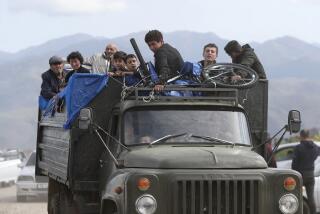Armenians Bow to Moscow, End 2-Month Strike
- Share via
MOSCOW — Bowing to massive government pressure, Armenians in the disputed Soviet territory of Nagorno-Karabakh on Monday ended a two-month general strike that had paralyzed the region and grown into a crisis of national proportions.
Most workers have returned to their jobs, according to the official news media. Buses and taxis were said to be operating normally for the first time since mid-May, and freight shipments were said to be arriving by road, rail and air.
“Almost everyone is returning to work,” an editor at the newspaper Sovietsky Karabakh said by telephone from Stepanakert, the territory’s capital. He said the city’s streets were crowded for the first time in weeks with people other than demonstrators.
80% Reported Back
The news agency Tass said that nearly 80% of the workers at Stepanakert’s 15 largest factories returned to their jobs Monday morning, as did construction, transport, retail and office workers, and that an even larger proportion of workers were back on the job in other towns.
An end to the prolonged strike in Nagorno-Karabakh, a predominantly Armenian enclave in the Caucasus mountains of the mainly Muslim southern Soviet republic of Azerbaijan, would be a major step toward restoring normalcy in the area, the focus of civil strife for nearly six months.
The conflict over the region has posed one of the most serious challenges yet to the program of political and economic liberalization of Soviet leader Mikhail S. Gorbachev.
Gorbachev’s critics have cited the unrest as the result of his policies of greater political freedom and fewer constraints, and even he denounced the people responsible for organizing the protests in Nagorno-Karabakh and Armenia as enemies of perestroika , as his reform program is known.
“We can see that democratic rights and new conditions created by perestroika are being clearly misused for anti-democratic purposes,” Gorbachev said last week, signaling the current government crackdown. “This is unacceptable.”
Most of Nagorno-Karabakh’s residents, Armenian Christians, want the region transferred to the jurisdiction of neighboring Armenia, ending what they regard as years of hated Turkish rule under the Turkic-speaking Muslim Azerbaijanis. But the Azerbaijan authorities refused to cede the territory and won central government support for their position.
That decision, although based on a program of economic and cultural development for the remote region, left much bitterness among the Armenians in Nagorno-Karabakh.
Situation ‘Very Tense’
“Today, people went to work,” an employee of the State Broadcasting Committee said by telephone from Stepanakert. “Transport is operating, and we have ended our strikes. But the situation is still very tense. The decision has done little for us, and we will continue this fight to the end. Still, what is the sense now of continuing to strike? We will have to devise a new strategy, new tactics.”
Earlier, a resident had told a reporter for the state television system’s major news program, “Vremya,” that “we will go back to work, but this doesn’t mean this matter has been finally resolved.”
In Armenia itself, official news agencies reported a broad return to normalcy after weeks of demonstrations, political rallies and intermittent strikes, though with lingering resentment over threats of permanent plant closures if production is not resumed.
More than 100 factories in Yerevan were reported to have been operating over the weekend to make up for time lost in a two-week sympathy strike supporting Nagorno-Karabakh.
Soviet television said Monday evening that the Armenian capital was almost back to normal, although reinforced police patrols were still in the city and troops were on the outskirts.
Western Reporters Barred
The actual conditions in Yerevan and in Nagorno-Karabakh could not be verified independently. Western correspondents have been prohibited from traveling to the area since February. Only fragmentary accounts from residents and political dissidents in Moscow are available to supplement the official reports.
In Moscow on Monday, the party leadership nominated Arkady I. Volsky, a top Central Committee official, as its special delegate for the Nagorno-Karabakh situation. He was empowered not only to take further measures to restore order but also to implement decrees on economic and social development in the region.
Armenian Communist Party leaders, meanwhile, announced that they have accepted Moscow’s decision on Nagorno-Karabakh. They also gave their support to the Kremlin-ordered crackdown on unrest, which had included giant rallies of up to 500,000 people in Yerevan.
The party also adopted a resolution curtailing the activities of the unofficial “Karabakh Committee,” which has been the main force behind the Yerevan meetings, and calling for stricter measures to control political dissent.
More to Read
Sign up for Essential California
The most important California stories and recommendations in your inbox every morning.
You may occasionally receive promotional content from the Los Angeles Times.










